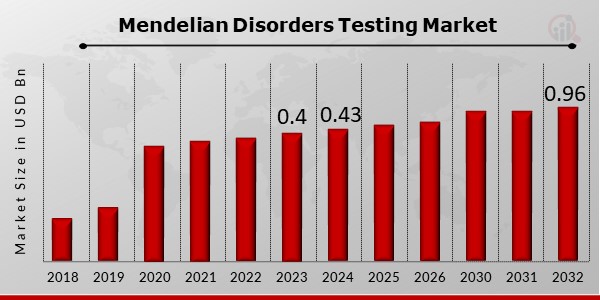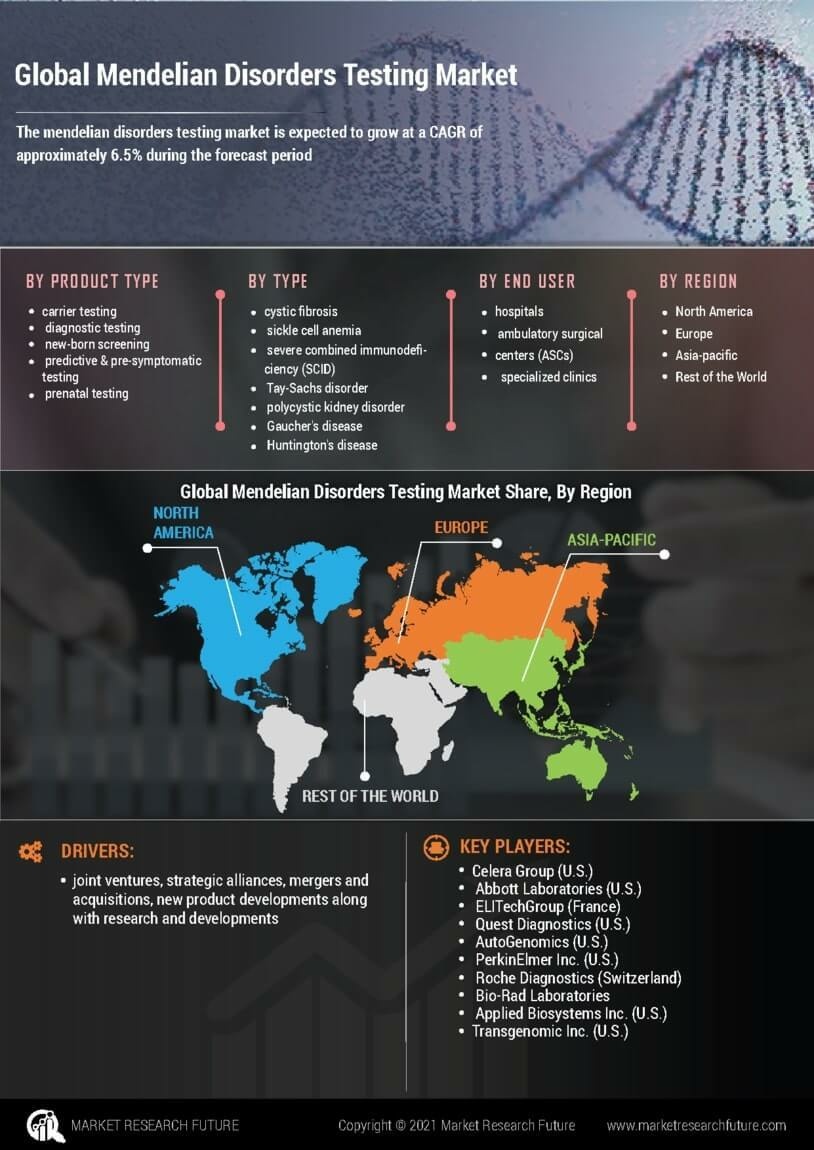Global Mendelian Disorders Testing Market Overview
Mendelian Disorders Testing Market Size was valued at USD 0.4 billion in 2023. The Mendelian Disorders Testing Market industry is projected to grow from USD 0.43 billion in 2024 to USD 0.96 billion by 2032, exhibiting a compound annual growth rate (CAGR) of 8.54% during the forecast period (2024 - 2032). Genetic testing involves the use of laboratory methods to study the genes inherited from mother or father. These tests may be used to identify increased risks of health problems, to diagnose the mutations in the genes, to choose treatments, or to assess responses to treatment.

Mendelian disorders also known as monogenic diseases arise due to the modifications in a single gene occurring in all cells of the body. Currently, it is estimated that over 10,000 of human diseases are known to be monogenic. These disorders are responsible for a heavy loss of life. The global prevalence of monogenic diseases at birth is approximately 10 in every 1000 infants.
The Mendelian disorders are caused by a single mutated gene which can be present on single or both chromosomes. Both females and males are equally affected by this disorder. Sickle cell anemia, Cystic fibrosis, Tay-Sachs disease, SCID, Gaucher's disease, Huntington's disease, neurofibromatosis, thalassemia, polycystic kidney disorder, and familial hypercholesterolemia are some of the common monogenic disorders. Nowadays, there are several tests performed to treat monogenic disorders such as diagnostic testing, carrier testing, predictive & pre-symptomatic testing, prenatal testing and new-born screening.
The carrier testing is a type of genetic testing that is used to determine a carrier person for monogenic disorders. Having said that, more and more genetic tests are being developed for a lot of other genetic disorders. Oncology segment has been the major focus area of the companies developing these tests as the large pool of population is affected by this fatal disease. The continuous rise in the prevalence of the genetic disorders has boosted the growth of the genetic testing market.
Intended Audience
- Mendelian Disorders Test Kit Suppliers
- Mendelian Disorders Test Kit Manufacturers
- Research and Development (R&D) Companies
- Medical Research Laboratories
- Academic Medical Institutes and Universities
- Sources: Annual reports, Press release, White paper, and Company presentation
- Description: Mendelian disorders testing Market, Mendelian disorders testing, Mendelian disorders testing Market in Europe, Mendelian disorders testing Market in Asia Pacific, Mendelian disorders testing Market in the Middle East
Mendelian Disorders Testing Market Segmentation
The Mendelian disorders testing market is segmented on the basis of test type, disorder type, and end-user.
Mendelian Disorders Testing Type Insights
On the basis of the test type, the Mendelian disorders testing market is segmented into carrier testing, diagnostic testing, new-born screening, predictive & pre-symptomatic testing, prenatal testing, and others
Mendelian Disorders Testing Disorder Type Insights
On the basis of the disorder type, the mendelian disorders testing market is segmented into cystic fibrosis, sickle cell anemia, severe combined immunodeficiency (SCID), Tay-Sachs disorder, polycystic kidney disorder, Gaucher's disease, Huntington's disease, neurofibromatosis, thalassemia, familial hypercholesterolemia, and others
Mendelian Disorders Testing End-User Insights
On the basis of the end user, the mendelian disorders testing market is segmented into hospitals, ambulatory surgical centers (ASCs), and specialized clinics.
Mendelian Disorders Testing Regional Insights
The Mendelian disorders testing market is segmented as the Americas, Europe, Asia Pacific and the Middle East and Africa.
The Americas is projected to hold the largest share of the mendelian disorders testing market. The unique opportunity drives the Mendelian disorders testing the market, and the focused issues stress on the need for more research on monogenic disorder tests. In the United States, sickle cell anemia affects around 72,000 people, the majority of this population have their ancestors from Africa. All the factors above are anticipated to boost the market growth in the U.S. and ensure its dominance over the forecast period.
Europe is expected to capture the second lead in this market in the coming five years owing to substantial technological advancements. About 6,000 people are affected with hemophilia in the UK. Moreover, about 5400 people in the U.K with hemophilia A and about 1100 with hemophilia B.
The market in the Asia Pacific is expected to witness the fastest growth rate due to increasing prevalence of monogenic disorders throughout the globe, which will boost the growth of the monogenetic disorders testing market.
The Middle East and Africa are also expected to show healthy growth in the coming five years.
Mendelian Disorders Testing Market Key Players
The existing players are strengthening their foothold in the industry by introducing technologically advanced products. Regulatory bodies such as the US FDA and the European CE mark, although stringent, are approving equipment that fulfills all clinical data requirement and other safety criteria.
- Roche Diagnostics (Switzerland)
- Bio-Rad Laboratories, Inc. (U.S.)
- Applied Biosystems Inc. (U.S.)
|
Report Attribute/Metric
|
Details
|
|
Market Size 2023
|
0.4 (USD Billion)
|
|
Market Size 2024
|
0.43 (USD Billion)
|
|
Market Size 2032
|
0.96 (USD Billion)
|
|
Compound Annual Growth Rate (CAGR)
|
8.54 % (2024 - 2032)
|
|
Report Coverage
|
Revenue Forecast, Competitive Landscape, Growth Factors, and Trends
|
|
Base Year
|
2023
|
|
Market Forecast Period
|
2024 - 2032
|
|
Historical Data
|
2019 - 2023
|
|
Geographies Covered
|
North America, Europe, Asia-Pacific, and Rest of the World (RoW)
|
|
Key Vendors
|
Celera Group (U.S.), Abbott Laboratories (U.S.), ELITechGroup (France), Quest Diagnostics (U.S.), AutoGenomics (U.S.), PerkinElmer Inc. (U.S.), Roche Diagnostics (Switzerland), Bio-Rad Laboratories, Inc. (U.S.), Applied Biosystems Inc. (U.S.), Transgenomic Inc. (U.S.), and others.
|
|
Key Market Opportunities
|
Rising awareness among healthcare professionals and patients about the importance of early and accurate diagnosis of Mendelian disorders is driving demand for testing services.
|
|
Key Market Drivers
|
Growing incidence of inherited genetic disorders drives the demand for early and accurate diagnostic testing.
|
Mendelian Disorders Testing Market Highlights:
Frequently Asked Questions (FAQ):
The mendelian disorders testing market is projected to grow at a 8.54% CAGR between 2024-2032.
The Americas is projected to lead the mendelian disorders testing market.
Major end users of the mendelian disorders testing market include specialized clinics, ambulatory surgical centers, and hospitals.
Key players profiled in the mendelian disorders testing market include Transgenomic Inc. (US), Applied Biosystems Inc. (US), Bio-Rad Laboratories, Inc. (US), Roche Diagnostics (Switzerland), PerkinElmer Inc. (US), AutoGenomics (US), Quest Diagnostics (US), ELITechGroup (France), Abbott Laboratories (US), and Celera Group (US).
Strategies adopted by key players to strengthen their position in the mendelian disorders testing market include strategic alliances, mergers, partnerships, new product launches, and acquisitions.















